
Topics
Guests
- Sonali Kolhatharaward-winning journalist and author, host of the radio and TV show Rising Up with Sonali.
We continue our coverage of the devastating wildfires in Southern California, which have killed at least 24 people as of Monday. Some 150,000 more have been forced to evacuate their homes and over 40,000 acres have burned up as firefighters struggle to contain the multiple fires still raging in the Los Angeles area.
Journalist and activist Sonali Kolhatkar, who recently returned to her home in Pasadena, describes community mutual aid efforts underway and how they stand in stark contrast to the militarized response from police and National Guard forces who are seemingly more interested in protecting property than helping residents. She warns that predatory real estate actors are also looking to profit from the devastation, particularly in the historically Black neighborhood of Altadena. “The embers haven’t even gone cold. The smoke is still rising, and the developers are circling,” she says.
Transcript
AMY GOODMAN: We begin today’s show in Los Angeles, where at least 24 people have been killed in devastating fires that have scorched and flattened entire communities over the last week. Dozens of people are still missing. The fires have burned over 40,000 acres and forced some 150,000 people to evacuate, while an estimated 12,000 homes and other structures have been destroyed or severely damaged. This is Los Angeles County Sheriff Robert Luna.
SHERIFF ROBERT LUNA: Yesterday we started a search and rescue operation out in the Eaton area, where in the first day of this operation, grid searching, we searched approximately 364 properties in the Altadena area. And unfortunately, during that search, we did locate three deceased. As these searches continue, I unfortunately anticipate that those numbers will increase.
AMY GOODMAN: Firefighting crews continue to battle three active blazes in the Los Angeles area, making progress over the weekend against the two biggest fires, Palisades and Eaton. But authorities warn of a new wave of strong winds expected to return to the area this week. Los Angeles County Fire Chief Anthony Marrone says the risk of new fires remains high.
ANTHONY MARRONE: Elevated critical fire weather conditions will continue through Wednesday. Please rest assured that your County of Los Angeles Fire Department will be prepared. These winds, combined with low humidities and low fuel moistures, will keep the fire threat in all of Los Angeles County very high.
AMY GOODMAN: As of Friday, nearly a thousand incarcerated firefighters had also been deployed to battle the catastrophic fires, working around the clock, with some making as little as between $5.80 to $10.24 a day. Meanwhile, wealthy residents in Los Angeles are hiring private firefighters who cost as much as $2,000 an hour to protect their property. Mexico has also sent firefighting personnel to help contain the L.A. fires. Laura Vázquez Alzúa is the head of Mexico’s Civil Protection.
LAURA VÁZQUEZ ALZÚA: [translated] We will stay as long as necessary. We will support in a spirit of solidarity and with all our experience and commitment to the people of California.
AMY GOODMAN: This comes as the U.S. Health and Human Services Department and Los Angeles County have both declared public health emergencies due to the smoke and particulate matter from the ongoing fires. Despite that, many schools located outside mandatory evacuation zones are scheduled to reopen today.
For more, we’re joined by two guests. Sonali Kolhatkar is an award-winning journalist and author and host of the radio and TV show Rising Up with Sonali. Her forthcoming book, Talking About Abolition: A Police-Free World Is Possible. She’s in Pasadena and had to evacuate. And Leah Stokes is with us, an associate professor of environmental politics at the University of California, Santa Barbara, researcher on climate and energy policy.
We’re going to go first to Sonali. Sonali, we spoke to you last week just after you evacuated your family, your parents, your kids. Can you talk about what you went through this weekend? Is your house still standing? And what about your community?
SONALI KOLHATKAR: Thank you so much, Amy. I appreciate that you had me on in the midst of my evacuation. I last spoke to you from a hotel I had evacuated to.
Friday morning, I returned to my home with my family. I am one of the lucky ones whose home is still standing. My husband and I went and checked on it. This house was very well sealed. And my elderly parents, who are disabled, it was very hard for them to remain evacuated. They hadn’t showered in days. And their house, which is right behind mine, is relatively new. So we made the decision to bring them back and, you know, had been covering every square foot we could with air purifiers in our house, wearing respirator masks, until the air indoors subsided and the quality increased and improved. We had to make sure that we were stocked up on bottled water, because we are being told that, out of some caution, the water should not be consumed for any kind of drinking or brushing teeth. So we had to make sure we had enough water. And it has been — you know, the air inside smelled of smoke for a while. Now it’s subsided quite a bit. We’re staying mostly indoors, although I have been walking around my community and trying to capture the stories of people who’ve lost everything.
On Friday afternoon, already there were crews of young people who were kind of deputized, if you will, by the Pasadena Job Center, which is basically a day laborer center here in Pasadena, to go around and help people clean up debris. People in Altadena — so, I live like one-and-a-half blocks south of the border with Altadena. That border is being completely barricaded and policed by local law enforcement, the sheriff’s department and National Guard. And so, anybody who wanted to go into Altadena to clean up couldn’t. So, North Pasadena sort of benefited from their volunteer efforts. A crew of young people came into my backyard, cleared up all the debris and bagged it in two hours. So, that helps mitigate any future danger from fires that we might expect this week.
I mean, it’s been quite remarkable to see my community rise up. There’s donation centers popping up spontaneously every couple of blocks. But there’s also this grim reality. You know, I’m driving west on Woodbury Avenue, and on the right there are law enforcement standing, just preventing from people going in. On the left, there’s members of the community who are helping one another. And those are such starkly different realities. And there’s a curfew in place in Altadena and the evacuation zone, so anybody who’s caught walking outside in Altadena after 6 p.m., even if they live there, is being arrested. And every day those barricades are coming further and further and further one block south into North Pasadena. So, it does feel like we’re living in a war zone.
There’s remarkable resiliency, but there’s also this grim sense that, you know, it could happen again. My concern is, no one’s really strongly linking what’s happening now to climate change, because we — my house may have survived this round of Santa Ana winds. What about the next round next week? Or what about next year and the year after that? So, yeah, it’s been — it’s been strange. I’m so lucky. I now know 23 people, and counting, who have lost their homes, people I saw just days before the fire and now who have GoFundMe pages set up. It’s very devastating.
AMY GOODMAN: And can you talk about the community of Altadena, the historically Black community, where Octavia Butler is buried?
SONALI KOLHATKAR: Yeah, she’s buried just a couple of miles from my home. I’ve visited her grave. Last year, my book club read Parable of the Sower, because her book, you know, was written in the '90s, but it is — it opens in July, I believe, summer 2024. So we sort of read it just a little bit after that. And it is so prescient, because it is a post-apocalyptic Southern California around Los Angeles. Octavia Butler called this area her home. The cemetery she's buried at, Mountain View Cemetery, is just on the Altadena side of the border. I drove by there yesterday. There seemed to be a little bit of damage. But the reports that I’m reading, because I still can’t go into Altadena, are that the cemetery was, by and large, not too damaged.
There’s a lovely, amazing Black-owned bookstore in North Pasadena called Octavia’s Bookshelf, run by Nikki High, a Black resident of Altadena, who has turned her bookstore into a hub, a local hub, of donations. I interviewed Nikki. She hasn’t even been back home. She thinks her home is standing. And she has just risen up for her community.
And she — I spoke yesterday with Perry Bennett, the owner and proprietor of Perry’s Joint, a beloved institution in North Pasadena, who was telling me about the tight-knit Black community in Altadena and Pasadena. And you’re right, you know, Altadena is home to about — 18% of its population is African American, so a little bit higher than the general country. And, you know, Altadena is a town that was rapidly gentrifying, but the Black community has stayed there for generations. I can count, you know, friends who have lost their family homes. And it’s a very tight-knit community. Perry Bennett was telling me yesterday how everybody knows everybody else. Everybody knows their moms and dads and neighbors.
I then encountered four young Black women who were giving away, setting up — who had set up a donation hub on someone’s front lawn. And they were incredible women who had grown up in North Pasadena, Altadena. Some of them are now going to college elsewhere, but they had come back. Their families were impacted.
It’s a tight-knit community. It’s a community where people have had the chance to own homes, because they hadn’t been redlined historically. And the people are grieving, wondering if they can rebuild those networks. There’s developers already circling around. You know, predatory capitalism waits for no one. And they are offering people — you know, offering to buy up their property already. And it’s insulting. I mean, the embers haven’t even gone cold. The smoke is still rising, and the developers are circling.
AMY GOODMAN: As Naomi Klein wrote about, The Shock Doctrine: The Rise of Disaster Capitalism. I wanted to turn to the science-fiction writer Octavia Butler on Democracy Now! back in 2005. You know, she writes about global warming, about totalitarianism. We spoke — we were one of the last interviews with her before she died and was buried in Altadena. We spoke after the catastrophic Hurricane Katrina.
OCTAVIA BUTLER: I wrote the two Parable books back in the '90s. And they are books about, as I said, what happens because we don't trouble to correct some of the problems that we’re brewing for ourselves right now. Global warming is one of those problems. And I was aware of it back in the ’80s. I was reading books about it. And a lot of people were seeing it as politics, as something very iffy, as something they could ignore because nothing was going to come of it tomorrow.
That and the fact that I think I was paying a lot of attention to education because a lot of my friends were teachers, and the politics of education was getting scarier, it seemed to me. We were getting to that point where we were thinking more about the building of prisons than of schools and libraries. And I remember while I was working on the novels, my hometown, Pasadena, had a bond issue that they passed to aid libraries, and I was so happy that it passed, because so often these things don’t. And they had closed a lot of branch libraries and were able to reopen them. So, not everybody was going in the wrong direction, but a lot of the country still was. And what I wanted to write was a novel of someone who was coming up with solutions of a sort.
AMY GOODMAN: Prophetic, the Black famous writer Octavia Butler back in 2005, from Pasadena, buried in Altadena. As she talked about prisons, Sonali, what about the incarcerated firefighters? We went out to California, interviewed them years ago, are now making, what, between $5 and $10 — not an hour, but a day — as they risk their lives, like other firefighters, to fight these blazes.
SONALI KOLHATKAR: Yes, yeah. And, you know, there’s not very many media outlets that are bringing up that aspect of the firefighting effort in Eaton Canyon and Palisades and all of the fires that have broken out. It is, to me, such a — so indicative of the ways in which our spending priorities are so skewed. Yes, it’s true that our fire departments are severely understaffed. So, instead of us training more non-incarcerated people or, for that matter, frankly, allowing incarcerated people to simply not be incarcerated so they can actually be active and, you know, fulfilling members — fulfilled members of our society, we turn to prison labor. And prison labor is used in so many different aspects of our capitalist society. Firefighting is one of them. I personally haven’t had the chance to interact with any of the firefighters here, because they’re in the thick of it, in the throes of fighting the fires. But, to me, this is why I talk about how it’s important for us to start veering away from policing and prisons and into keeping us really safe. Incarcerated firefighters are trying to keep us safe, but they themselves are part of the architecture of violence, and they are the victims of the architecture of violence, as well.
In my new book, Talking About Abolition: A Police-Free World Is Possible, I speak with 12 abolitionists who talk about these very issues, about how we need to start funding the things that truly keep us safe. The climate, right? One of the people I interview is Leah Penniman, who works on food justice issues; Melina Abdullah, who talks about participatory budgeting; the great Gina Dent, Ruth Wilson Gilmore, Dylan Rodríguez, longtime abolitionists who talk about the importance of pulling money out of policing and the architectures of death making and into the things that keep us safe; Robin D. G. Kelley, who wrote the foreword to the book, who’s been on Democracy Now! many times. You know, there are people who have been thinking for so long and strategically about — primarily Black leaders and activists, who I interview in the book, who have been thinking about how we start applying an abolitionist framework to our economy, to our society. And in such a framework, in such a world, we would not only be climate resilient, we would not only not have incarceration at the mass level that we do now, we would have less crime, we would have fewer fires, because we would have dealt with the climate crisis, and we would have more resilient homes, and we would have equity along racial lines. This is the world that we need to manifest and make happen and actually fight for, rather than the apocalyptic promise of a racial capitalism and policing and prisons, which is what we’re living in right now.
AMY GOODMAN: And people can recognize the incarcerated firefighters by their orange jumpsuits.
SONALI KOLHATKAR: Yes.

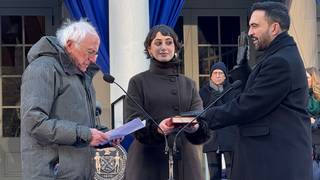
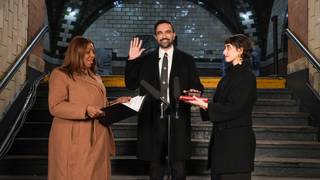
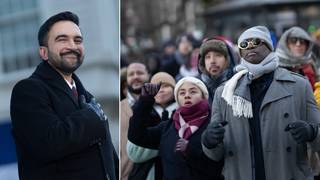
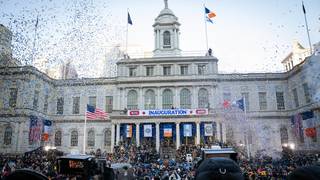
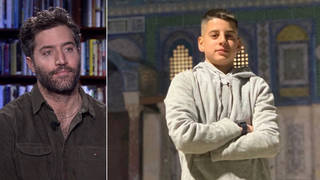






Media Options